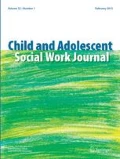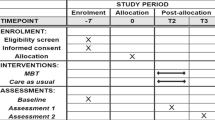Abstract
Young children who enter foster care experience disruptions in care and maltreatment at a point when maintaining attachment relationships is a key, biologically based task. In previous research, we have found that young children experience challenges as they form attachments with new caregivers. They tend to push their new caregivers away, even though such children are especially in need of nurturing care. Further, many caregivers do not respond in nurturing ways when their children are distressed, which we have found is problematic for young children in foster care. We developed an intervention that is designed to help caregivers provide nurturance even when children do not elicit it, and even when it does not come naturally to them. This paper presents preliminary findings of the effectiveness of this intervention on children’s attachment behaviors. Forty-six children were randomly assigned to either the experimental intervention or to an educational intervention. For three consecutive days, attachment behaviors were reported across three distress-eliciting situations. Children whose parents had received the experimental intervention showed significantly less avoidance than children whose parents had received the educational intervention. These preliminary results suggest that the intervention is successful in helping children develop trusting relationships with new caregivers.
Similar content being viewed by others
References
Ainsworth, M. D. (1964). Patterns of attachment behavior shown by the infant in interaction with his mother. Merrill-Palmer Quarterly, 10(1), 51–58.
Ainsworth, M. D., Bell, S. M., & Stayton, D. J. (1972). Individual differences in the development of some attachment behaviors. Merrill-Palmer Quarterly, 18(2), 123–143.
Ainsworth, M. D. S., Blehar, M. C., Waters, E., & Wall, S. (1978). Patterns of attachment: A psychological study of the strange situation. Hillsdale, NJ: Erlbaum.
Bowlby, J. (1969/1982). Attachment and loss: Vol. 1. Attachment. New York: Basic.
Bretherton, I. (1995). A communication perspective on attachment relationships and internal working models. Monographs of the Society for Research in Child Development, 60(2–3, Serial No. 244).
Brooks-Gunn, J., Klebanov, P. K., Liaw, F., & Spiker, D. (1993). Enhancing the development of low-birthweight, premature infants: Changes in cognition and behavior over the first three years. Child Development, 64(3), 736–753. doi:10.2307/1131215.
Carlson, E. A. (1998). A prospective longitudinal study of disorganized/disoriented attachment. Child Development, 69, 1107–1128.
Dozier, M., Peloso, E., Lindhiem, O., Gordon, M.K., Manni, M., Sepulveda, S., Ackerman, J., Bernier, A., & Levine, S. (2006). Preliminary evidence from a randomized clinical trial: Intervention effects on foster children’s behavioral and biological regulation. The Journal of Social Issues, 62, 767–785.
Dozier, M., Stovall, K. C., Albus, K. E., & Bates, B. (2001). Attachment for infants in foster care: The role of caregiver state of mind. Child Development, 72, 1467–1477. doi:10.1111/1467-8624.00360.
Fisher, P. A., Burraston, B., & Pears, K. (2005). The early intervention foster care program: Permanent placement outcomes from a randomized trial. Child Maltreatment, 10, 61–71. doi:10.1177/1077559504271561.
Korfmacher, J., Adam, E., Ogawa, J., & Egeland, B. (1997). Adult attachment: Implications for the therapeutic process in a home visitation intervention. Applied Developmental Science, 1, 43–52. doi:10.1207/s1532480xads0101_5.
Lyons-Ruth, K. (1996). Attachment relationships among children with aggressive behavior problems: The role of disorganized early attachment patterns. Journal of Consulting and Clinical Psychology, 64, 64–73. doi:10.1037/0022-006X.64.1.64.
Main, M., Goldwyn, R., & Hesse, E. (2002). Adult attachment scoring and classification systems (Version 7). Unpublished manual.
Main, M., & Solomon, J. (1990). Procedures for identifying infants as disorganized/disoriented during the Ainsworth strange situation. In M. T. Greenberg, D. Cicchetti, & E. M. Cummings (Eds.), Attachment in the preschool year: Theory, research, and intervention (pp. 121–160). Chicago: University of Chicago Press.
Ramey, C. T., McGinness, G. D., Cross, M., Collier, A. M., & Barrie-Blackley, S. (1982). The Abecedarian approach to social competence: Cognitive and linguistic intervention for disadvantages preschoolers. In K. Borman (Ed.), The social life of children in a changing society. Hillsdale, NJ: Erlbaum.
Ramey, C. T., Yeates, K. O., & Short, E. J. (1984). The plasticity of intellectual development: Insights from preventive intervention. Child Development, 55(5), 1913–1925. doi:10.2307/1129938.
Stovall, K. C., & Dozier, M. (2000). The development of attachment in new relationships: Single subject analyses for 10 foster infants. Development and Psychopathology, 12, 133–156. doi:10.1017/S0954579400002029.
Stovall-McClough, K. C., & Dozier, M. (2004). Forming attachments in foster care: Infant attachment behaviors in the first 2 months of placement. Development and Psychopathology, 16, 253–271.
van Ijzendoorn, M. H. (1995). Adult attachment representations, parental responsiveness, and infant attachment: A meta-analysis on the predictive validity of the adult attachment interview. Psychological Bulletin, 117, 387–403. doi:10.1037/0033-2909.117.3.387.
Acknowledgments
Support for this research was provided by NIMH R01 52135 and NIMH K02 74374 to the first author. We acknowledge the support of Philadelphia Department of Human Services and Delaware Division of Family Services; and caseworkers, foster families, birth families, and children at both agencies.
Author information
Authors and Affiliations
Corresponding author
Rights and permissions
About this article
Cite this article
Dozier, M., Lindhiem, O., Lewis, E. et al. Effects of a Foster Parent Training Program on Young Children’s Attachment Behaviors: Preliminary Evidence from a Randomized Clinical Trial. Child Adolesc Soc Work J 26, 321–332 (2009). https://doi.org/10.1007/s10560-009-0165-1
Received:
Accepted:
Published:
Issue Date:
DOI: https://doi.org/10.1007/s10560-009-0165-1




